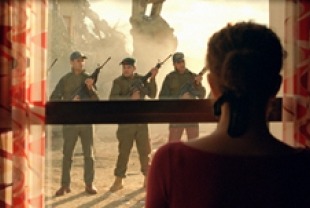 A Community Film Series
A Community Film Series
September 22 – Uncovered: The War on Iraq
October 20 – Rana’s Wedding
November 10 – Hidden in Plain Sight
December 1 – Until When . . .
Edgewood College, Predolin Humanities Center, Anderson Auditorium
7:00 pm for all showings
“The Arts Go to War”, an Edgewood human issues class; the Madison-Rafah Sister City Project, and the School of the Americas Watch — Madison join forces to bring you four thought-provoking, disturbing, and enlightening films. An audience discussion will follow each film. All films are free and open to the public.
September 22 – Uncovered: The War on Iraq
Documentary; Director: Robert Greenwald; 2004; 87 minutes
Filmmaker Robert Greenwald chronicles the Bush Administration’s case to invade Iraq following Sept. 11, 2001. The film examines the administration’s argument for war through interviews with U.S intelligence and defense officials, foreign service experts and U.N. weapons inspectors — including a former CIA director, a former ambassador to Saudi Arabia and President Bush’s Secretary of the Army.
“When the Bush Administration’s case for war in Iraq shifted from the existence of weapons of mass destruction to the existence of ‘weapons of mass destruction-related activities’, director Robert Greenwald got angry. Uncovered: The War On Iraq is his response; a powerful, well-constructed and sober documentary that – via a dense collection of interviews with intelligence experts, diplomats, weapons inspectors, and politicians – painstakingly and ruthlessly takes apart the American government’s changing arguments for invasion.” – Jonathan Trout, BBC
October 20 – Rana’s Wedding
Feature; Director: Hany Abu-Assad; 2002; 90 minutes
Shot on location in East Jerusalem, Ramallah, and checkpoints in between, Palestinian director Hany Abu-Assad sees the Palestinian-Israeli conflict through the eyes of a young woman who, with only ten hours to marry, must negotiate her way around roadblocks, soldiers, stonethrowers, overworked officials and into the heart of an elusive lover.
Roger Ebert says Rana’s Wedding is ” . . . fascinating as a document. It gives a more complete visual picture of the borders, the Palestinian settlements and the streets of Jerusalem than we ever see on the news . . .” Phil Hall of Film Threat says Rana’s Wedding is “among the finest films made in the Middle East.”
November 10 – Hidden in Plain Sight
Documentary; Director: John H. Smihula; 2003; 90 minutes
Hidden in Plain Sight is a feature-length documentary that looks at the nature of U.S. policy in Latin America through the prism of the School of the Americas (renamed, in January of 2001, the Western Hemisphere Institute for Security Cooperation), the controversial military school that trains Latin American soldiers in the USA.
Demonstrators denounce the SOA as a “School of Assassins,” but Army officials argue that the school has played a crucial role in bringing democracy and stability to Latin America. On this issue, the U.S. Congress is sharply divided. Enter noted scholars Noam Chomsky, Eduardo Galeano, Christopher Hitchens, and Michael Parenti, who broaden the debate to include such subjects as militarism, globalization, national security, and international terrorism. Personal accounts from victims of the violence and repression in Latin America raise questions and concerns about the true aims of U.S. foreign policy.
Informative and provocative, this documentary presents different points of view which illuminate the turbulent reality of Latin America, demystify the policy-making process, and shed light on some of the most complex and urgent problems facing U.S. citizens today.
December 1 – Until When . . .
Documentary; Director: Dahna Abourahme; 2004; 76 minutes
Until When . . . explores the lives of four Palestinian families who live in Dheisheh Refugee Camp near Bethlehem. People share their experiences with the Israeli occupation and how it affects their lives. Director Dahna Abourahme integrates archival photographs, map animations, and informational text into the film’s historical journey. The personal stories convey sadness, frustration and nostalgia for absent family members. However, they live and marry, so the families dance and ululate when they celebrate momentous occasions.
Sonia Nettnin writes in Scoop: “Palestinians affirm their human rights to freedom from oppression now and for future generations. Their shared feelings weave a narrative thread that leads to hope.”
Contacts:
Sr. Maureen McDonnell, mcdonnel at edgewood.edu
RafahSisterCity at yahoo.com